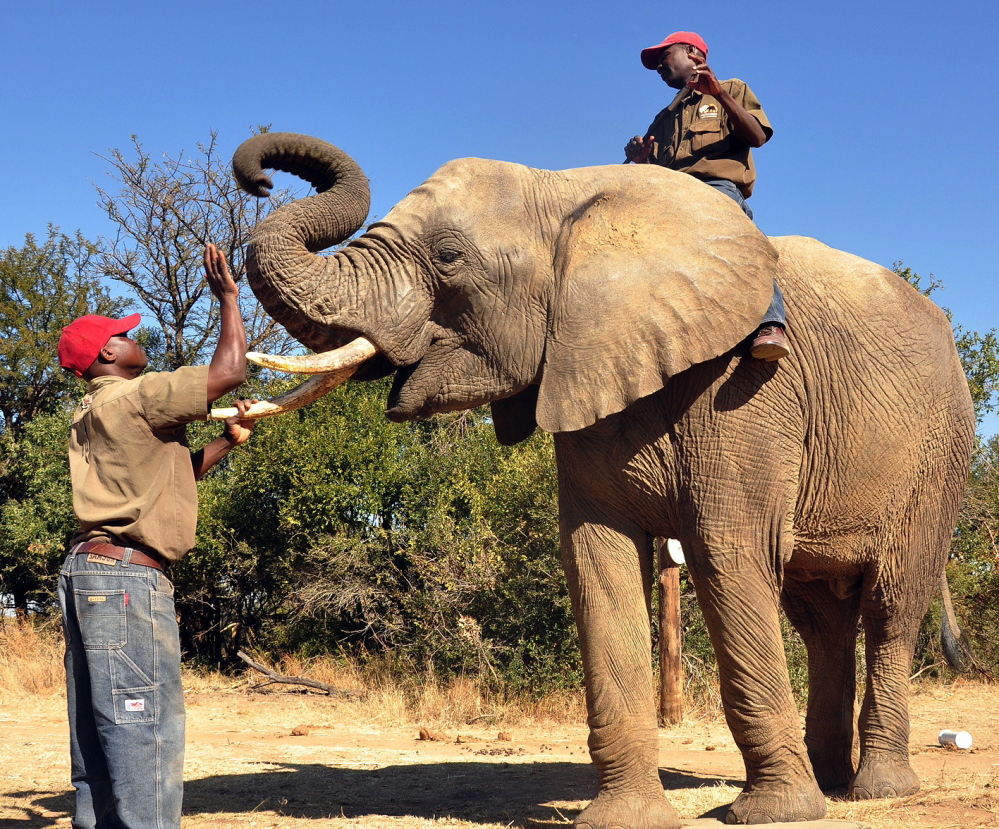JOHANNESBURG — Armed with a sharp sense of smell, dogs have a long history of detecting explosives for their human handlers. Trained rats sniff out land mines from old African wars. In Croatia, researchers have tried to train bees to identify TNT.
Now elephants. New research conducted in South Africa and involving the U.S. military shows they excel at identifying explosives by smell, stirring speculation about whether their extraordinary ability can save lives. “They work it out very, very quickly,” said Sean Hensman, co-owner of a game reserve where three elephants passed the smell tests by sniffing at buckets and getting a treat of marula, a tasty fruit, when they showed that they recognized samples of TNT, a common explosive, by raising a front leg.
Another plus: elephants remember their training longer than dogs, said Stephen Lee, head scientist at the U.S. Army Research Office, a major funder of the research.
A pachyderm’s potential prowess in detecting explosives was noticed in Angola, a country that many elephants had returned to after a 2002 peace deal ended a protracted war that saw many elephants slaughtered. While there was peace, the land remained sown with mine fields. Some elephants seemed to intentionally avoid them, though it might not have been a scent that kept them away. Researchers were inspired to find out what was going on.
Near Bela-Bela, a town north of the South African capital of Pretoria, elephants named Shan, Mussina and Chishuru were administered smelling tests. The elephants detected TNT samples 73 out of the 74 times that they encountered its odor in a line of buckets, said Ashadee Kay Miller, a zoology student at the University of the Witwatersrand in Johannesburg.
In the same tests, the elephants wrongly identified only 18 out of 502 buckets as containing TNT, amounting to a 3.6 ercent error rate, Miller said.
In a second set of tests, the elephants scored 100 percent, detecting TNT in 23 out of 23 buckets when “distractor odors” of tea, bleach, soap and gasoline were added.
Lugging around the huge mammals to mine fields wouldn’t be practical, so one idea is to bring parts of the mine fields to them.
Unmanned drones would collect scent samples from mined areas; a trained elephant would then smell them and alert handlers to any sign of explosives, Hensman said.
Send questions/comments to the editors.



Success. Please wait for the page to reload. If the page does not reload within 5 seconds, please refresh the page.
Enter your email and password to access comments.
Hi, to comment on stories you must . This profile is in addition to your subscription and website login.
Already have a commenting profile? .
Invalid username/password.
Please check your email to confirm and complete your registration.
Only subscribers are eligible to post comments. Please subscribe or login first for digital access. Here’s why.
Use the form below to reset your password. When you've submitted your account email, we will send an email with a reset code.